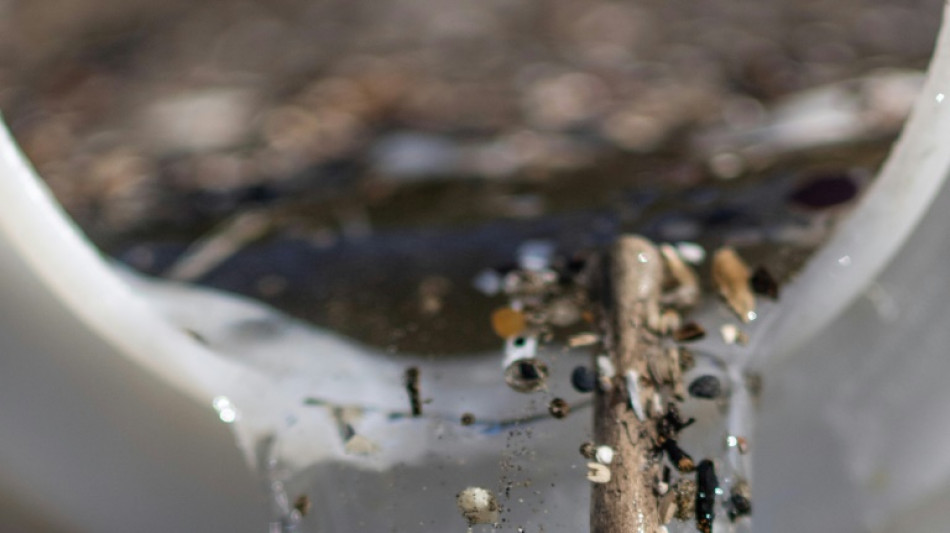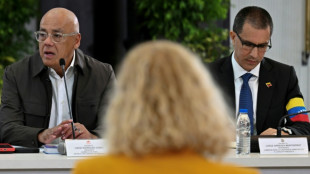
-
 NFL names 49ers to face Rams in Aussie regular-season debut
NFL names 49ers to face Rams in Aussie regular-season debut
-
Bielle-Biarrey sparkles as rampant France beat Ireland in Six Nations

-
 Flame arrives in Milan for Winter Olympics ceremony
Flame arrives in Milan for Winter Olympics ceremony
-
Olympic big air champion Su survives scare

-
 89 kidnapped Nigerian Christians released
89 kidnapped Nigerian Christians released
-
Cuba willing to talk to US, 'without pressure'

-
 Famine spreading in Sudan's Darfur, UN-backed experts warn
Famine spreading in Sudan's Darfur, UN-backed experts warn
-
2026 Winter Olympics flame arrives in Milan

-
 Congo-Brazzaville's veteran president declares re-election run
Congo-Brazzaville's veteran president declares re-election run
-
Olympic snowboard star Chloe Kim proud to represent 'diverse' USA

-
 Iran filmmaker Panahi fears Iranians' interests will be 'sacrificed' in US talks
Iran filmmaker Panahi fears Iranians' interests will be 'sacrificed' in US talks
-
Leicester at risk of relegation after six-point deduction

-
 Deadly storm sparks floods in Spain, raises calls to postpone Portugal vote
Deadly storm sparks floods in Spain, raises calls to postpone Portugal vote
-
Trump urges new nuclear treaty after Russia agreement ends

-
 'Burned in their houses': Nigerians recount horror of massacre
'Burned in their houses': Nigerians recount horror of massacre
-
Carney scraps Canada EV sales mandate, affirms auto sector's future is electric

-
 Emotional reunions, dashed hopes as Ukraine soldiers released
Emotional reunions, dashed hopes as Ukraine soldiers released
-
Bad Bunny promises to bring Puerto Rican culture to Super Bowl

-
 Venezuela amnesty bill excludes gross rights abuses under Chavez, Maduro
Venezuela amnesty bill excludes gross rights abuses under Chavez, Maduro
-
Lower pollution during Covid boosted methane: study

-
 Doping chiefs vow to look into Olympic ski jumping 'penis injection' claims
Doping chiefs vow to look into Olympic ski jumping 'penis injection' claims
-
England's Feyi-Waboso in injury scare ahead of Six Nations opener

-
 EU defends Spain after Telegram founder criticism
EU defends Spain after Telegram founder criticism
-
Novo Nordisk vows legal action to protect Wegovy pill

-
 Swiss rivalry is fun -- until Games start, says Odermatt
Swiss rivalry is fun -- until Games start, says Odermatt
-
Canadian snowboarder McMorris eyes slopestyle after crash at Olympics

-
 Deadly storm sparks floods in Spain, disrupts Portugal vote
Deadly storm sparks floods in Spain, disrupts Portugal vote
-
Ukrainian flag bearer proud to show his country is still standing

-
 Carney scraps Canada EV sales mandate
Carney scraps Canada EV sales mandate
-
Morocco says evacuated 140,000 people due to severe weather

-
 Spurs boss Frank says Romero outburst 'dealt with internally'
Spurs boss Frank says Romero outburst 'dealt with internally'
-
Giannis suitors make deals as NBA trade deadline nears

-
 Carrick stresses significance of Munich air disaster to Man Utd history
Carrick stresses significance of Munich air disaster to Man Utd history
-
Record January window for transfers despite drop in spending

-
 'Burned inside their houses': Nigerians recount horror of massacre
'Burned inside their houses': Nigerians recount horror of massacre
-
Iran, US prepare for Oman talks after deadly protest crackdown

-
 Winter Olympics opening ceremony nears as virus disrupts ice hockey
Winter Olympics opening ceremony nears as virus disrupts ice hockey
-
Mining giant Rio Tinto abandons Glencore merger bid

-
 Davos forum opens probe into CEO Brende's Epstein links
Davos forum opens probe into CEO Brende's Epstein links
-
ECB warns of stronger euro impact, holds rates

-
 Famine spreading in Sudan's Darfur, warn UN-backed experts
Famine spreading in Sudan's Darfur, warn UN-backed experts
-
Lights back on in eastern Cuba after widespread blackout

-
 Russia, US agree to resume military contacts at Ukraine talks
Russia, US agree to resume military contacts at Ukraine talks
-
Greece aims to cut queues at ancient sites with new portal

-
 No time frame to get Palmer in 'perfect' shape - Rosenior
No time frame to get Palmer in 'perfect' shape - Rosenior
-
Stocks fall as tech valuation fears stoke volatility

-
 US Olympic body backs LA28 leadership amid Wasserman scandal
US Olympic body backs LA28 leadership amid Wasserman scandal
-
Gnabry extends Bayern Munich deal until 2028

-
 England captain Stokes suffers facial injury after being hit by ball
England captain Stokes suffers facial injury after being hit by ball
-
Italy captain Lamaro amongst trio set for 50th caps against Scotland


'Time bomb'?: Race to identify health effects of microplastics
Tiny pieces of plastic have been found littered throughout human bodies, trapped in our lungs and laced through our blood, but the long-term health effects of this exposure remain unclear.
Every day humans ingest, inhale or otherwise come in contact with microplastics, plastic pollution less than five millimetres (0.2 inches) in diameter that is mostly invisible to the naked eye.
Microplastics have been found most everywhere on Earth, from the deepest oceans to the highest mountains, as well as in the air, water, soil and food chain.
But in the last couple of years scientists have discovered microplastics not just throughout nature but also throughout human bodies, detecting it in lungs, livers -- even in placentas.
Last year a Dutch study became the first to identify microplastics in human blood.
While scientists have urged caution due to the study's small sample size, the presence of microplastics could suggest it is being transported through the bloodstream into organs.
But for now, the data remain incomplete on the health effects of microplastics, a complex cocktail of polymers and chemicals that could smuggle in other contaminants in what is called the "Trojan Horse" effect.
- 'Insidious' -
Xavier Coumoul, a toxicologist at French medical research institute INSERM, told AFP that there has been "more and more research" in the area over the last decade.
But he said that research had been late to get started because -- similar to global warming -- the "insidious changes" crept up so slowly.
"We do not know whether our level of exposure will lead to chronic or acute illnesses in the long term -- but we can legitimately ask the question," he said.
Research has shown that microplastics have a range of detrimental effects on the health of animals, including an increase in inflammation, oxidative stress and damage to cells.
"Both in human and mice lung tissues, we have seen an inhibitory effect on development after putting plastic fibres inside organoids, mini-lungs grown" from stem cells, said Barbro Melgert, a respiratory immunologist at the University of Groningen in the Netherlands.
"This effect seemed not to be caused by the plastic itself, but by something leaking from the (plastic particles), some chemicals added," she said.
"But we don't know exactly what chemical was involved," she said. "It's very difficult to find out, especially with low quantities."
Indeed, the roles that the shape, size and type of microplastic -- as well as additives -- remain poorly understood. But researchers are working on it.
Last week, a study in the journal Physics of Fluid modelled how different sizes of inhaled microplastics rattled through human airways, finding that they tended to collect in the nasal cavity or in the back of the throat.
- Tipping point? -
It is also unclear how much microplastic individual people are exposed to.
"We don't really know how much microplastics we breathe, there's not a lot of studies," Melgert said, adding that research over longer time periods was needed.
The World Wildlife Fund made headlines in 2019 by estimating that people ingest around five grams of plastic a week, the equivalent of a credit card.
The methodology and findings of the study the WWF was citing have been contested, and other research has indicated a lower level of individual exposure.
But experts are still sounding the alarm.
Coumoul compared microplastics to pesticides, saying "it has sometimes taken a long time to identify the long-term risk to humans".
"Let's try to prevent a time bomb," Melgert said.
And an even greater tidal wave of plastic looms on the horizon.
On current trends, annual production of fossil-fuel plastic will nearly triple by 2060 to 1.2 billion tonnes.
Melgert warned that humanity's ever-increasing production of plastic means that we could soon "pass a critical limit" for human exposure.
Earlier this month, there was some rare goods news in the fight against plastic pollution.
After five days of gruelling talks, 175 nations gathered in Paris agreed to reveal the first draft of a much-anticipated plastic pollution treaty by the end of November.
For now, experts recommend that people limit their exposure to microplastics by ventilating their homes, not eating out of plastic containers and avoiding synthetic textiles such as polyester.
D.Khalil--SF-PST




